
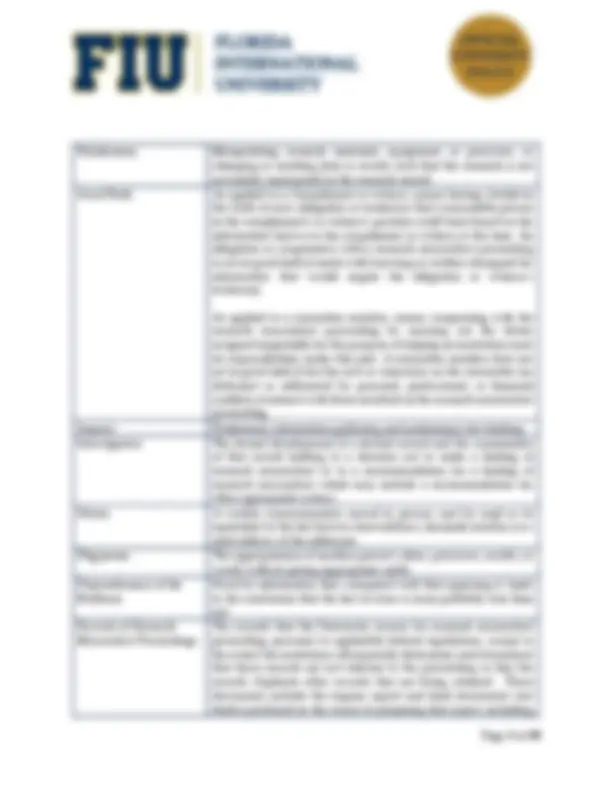
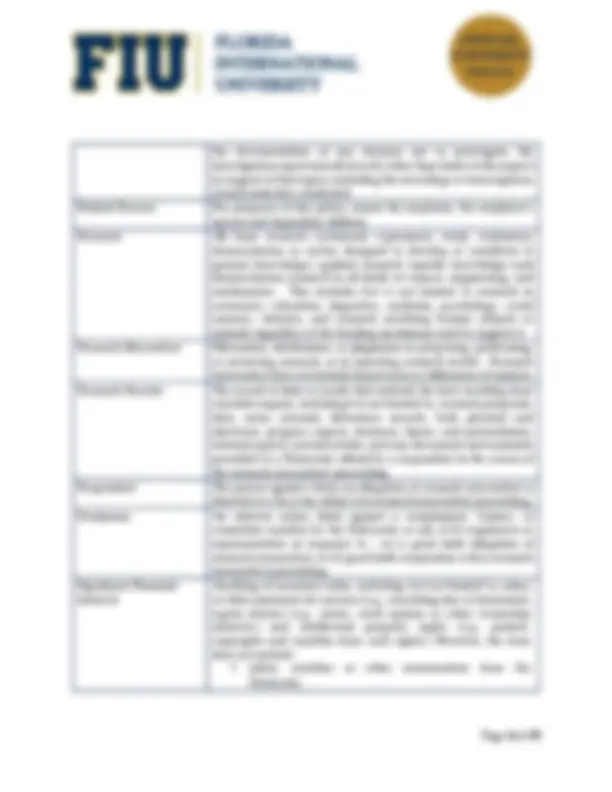
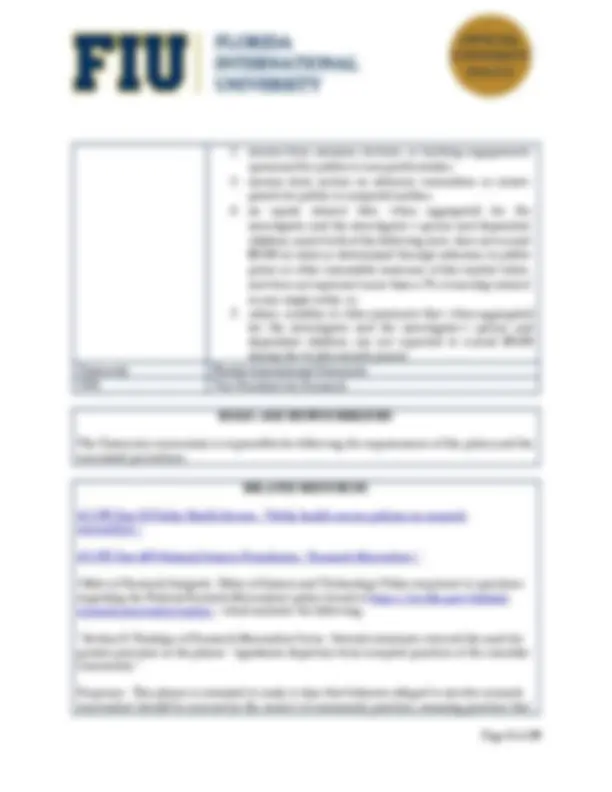
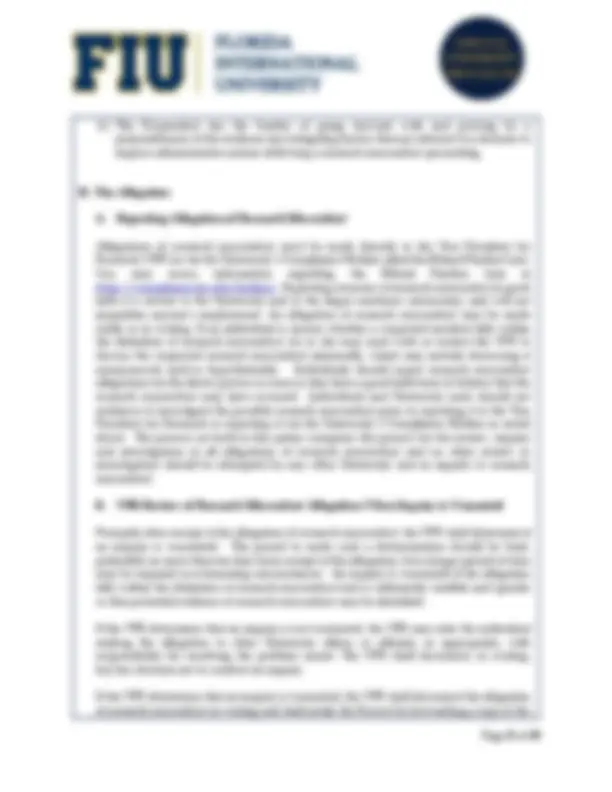
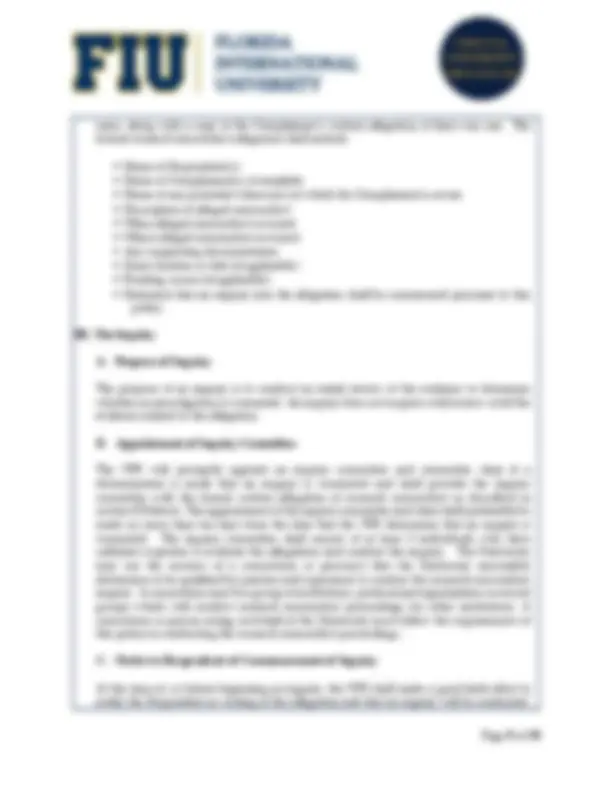
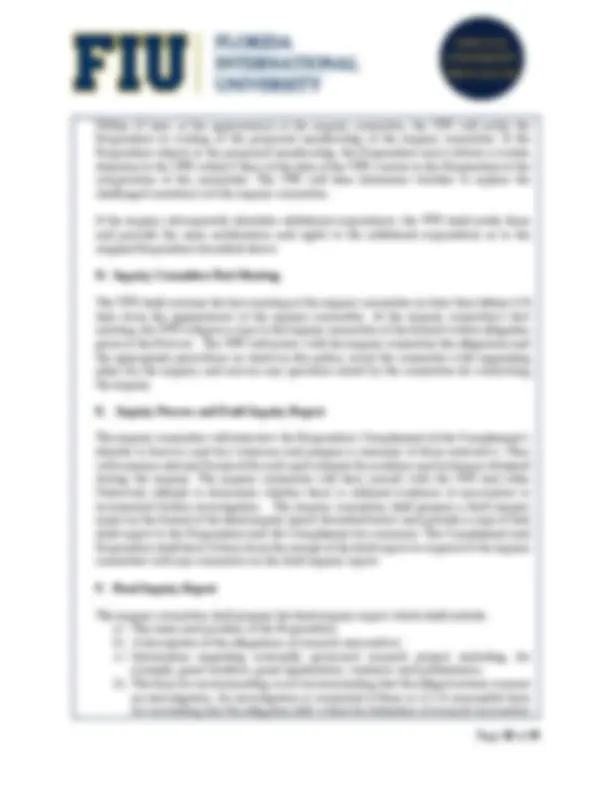
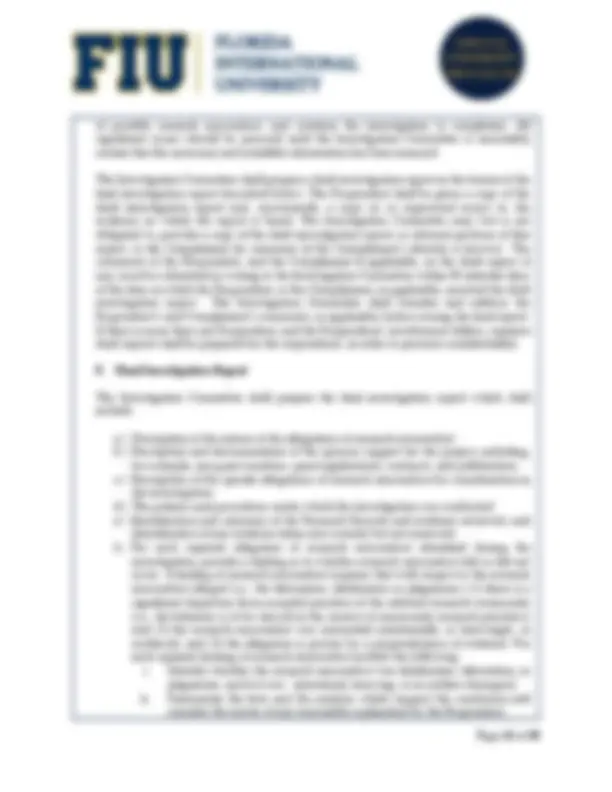
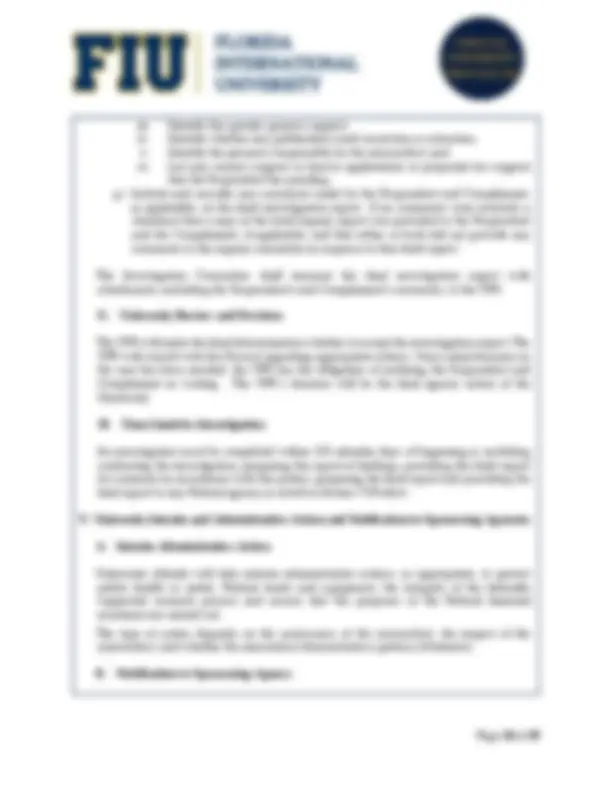
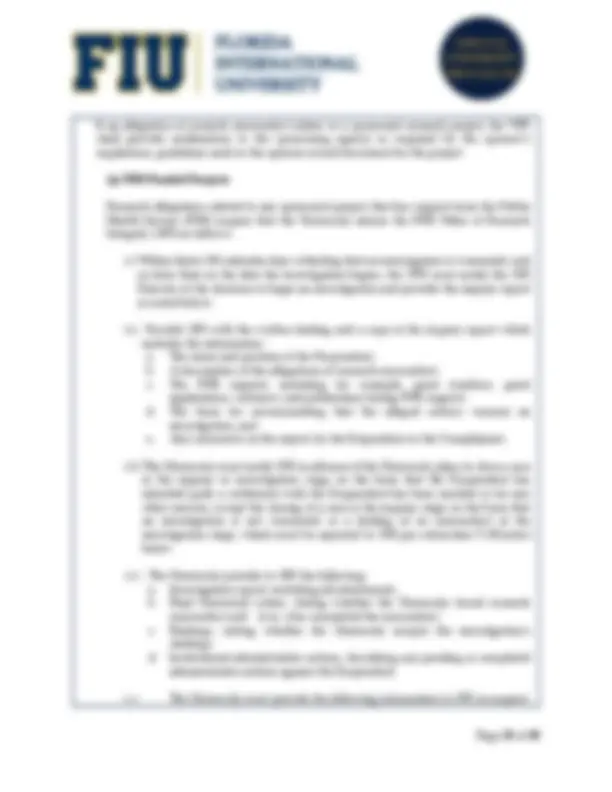
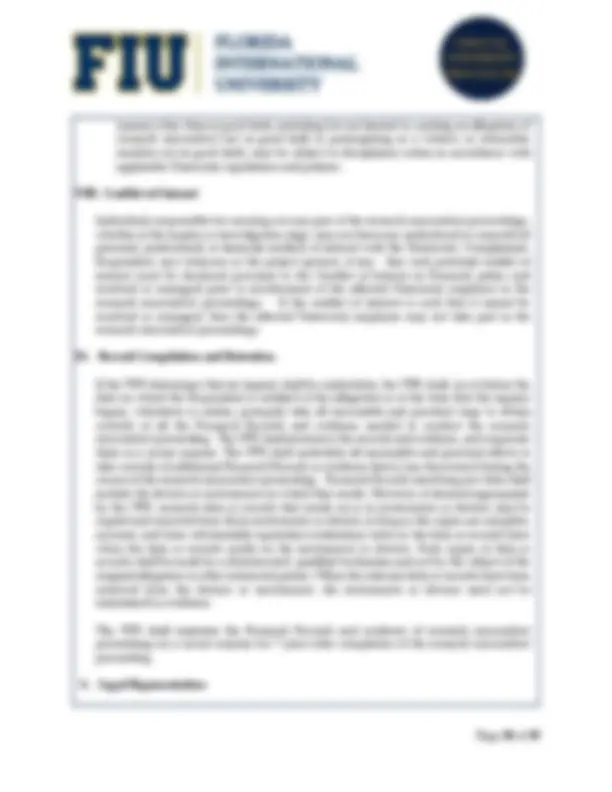
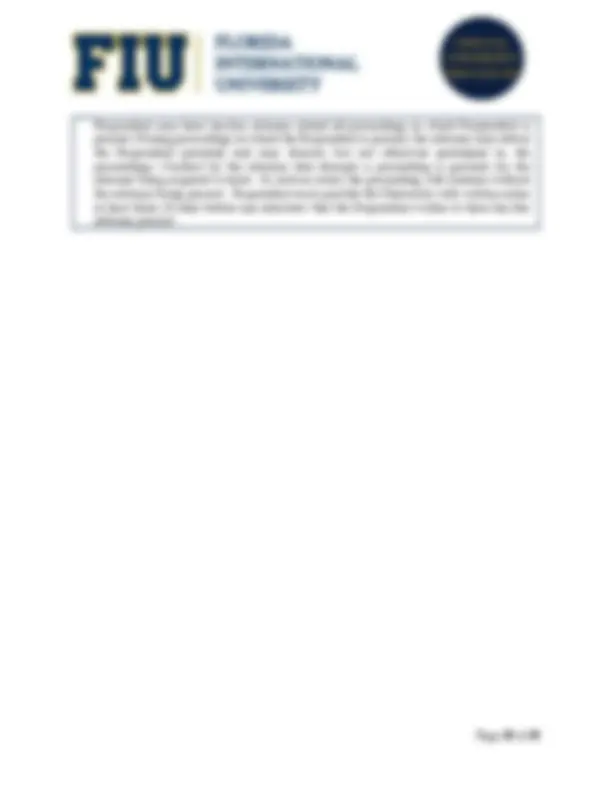


Study with the several resources on Docsity

Earn points by helping other students or get them with a premium plan


Prepare for your exams
Study with the several resources on Docsity

Earn points to download
Earn points by helping other students or get them with a premium plan
Community
Ask the community for help and clear up your study doubts
Discover the best universities in your country according to Docsity users
Free resources
Download our free guides on studying techniques, anxiety management strategies, and thesis advice from Docsity tutors
The policy and procedures of a university regarding research misconduct, including definitions, reporting processes, investigation steps, and potential consequences. The policy aims to maintain ethical standards in research, protect the rights of research subjects and the public, and ensure the integrity of research funding. Allegations of research misconduct, such as fabrication, falsification, or plagiarism, must be reported to the Office of Research and Economic Development. details on the investigation process, including the purpose, evidence requirements, and potential outcomes.
What you will learn
Typology: Schemes and Mind Maps
1 / 19

This page cannot be seen from the preview
Don't miss anything!












January 27, 2006
November 24, 2020
Office of Research and Economic Development
It is the policy of the University that all persons involved in University research, including without limitation, University faculty, staff, and students and non-University personnel collaborating on University research, maintain high ethical standards in the conduct and reporting of their research. Allegations of research misconduct are to be reported to, and shall be investigated and, if the allegations are substantiated, sanctioned by, the University as set forth in this policy. This policy applies to students and all individuals who are employed by or are agents of, the University, or who are affiliated with the University by contract or agreement and who are engaged in any University research project whether or not the research is supported by external funding.
All persons involved in University research.
The University bears the primary responsibility for prevention and detection of research misconduct and for the inquiry, investigation, and adjudication of alleged research misconduct. The University must take action necessary to ensure the integrity of research, the rights and interests of research subjects and the public, the protection of sponsor funds from misuse by ensuring the integrity of the research work, the observance of legal requirements or responsibilities and to provide appropriate safeguards for subjects of allegations, as well as complainants.
This policy sets forth procedures for addressing allegations of research misconduct in compliance with applicable laws and regulations and in a manner which is thorough, competent, objective and fair. This policy seeks to:
a) Foster a research environment that promotes the responsible conduct of research, research training, and activities related to that research or research training,
discourages research misconduct, and deals promptly with allegations or evidence of possible research misconduct; b) Set forth reasonable and practical steps to protect the positions and reputations of good faith complainants, witnesses and committee members and protect them from retaliation by respondents and other University members; c) Provide confidentiality to the extent required by applicable laws and regulations to all respondents, complainants, and research subjects identifiable from Research Records or evidence; d) Take reasonable and practical steps to ensure the cooperation of respondents and other University members with research misconduct proceedings, including, but not limited to, their providing information, Research Records, and evidence; e) Set forth the manner in which the University will cooperate with federal agencies during any research misconduct proceeding or compliance review; f) Assist in administering and enforcing any federal agency administrative actions imposed on the University.
Allegation A disclosure of possible research misconduct through any means of communication. The disclosure may be by written or verbal statement or other communication. Complainant A person who in good faith makes an allegation of research misconduct. Conflict of Interest When a person’s professional judgment or adherence to widely recognized professional norms may be, or may appear to be, compromised by the person’s or a Related Person’s interests, commitments, obligations or loyalties outside the University. A conflict of interest may exist by virtue of financial or other personal considerations that have the potential to compromise or bias professional judgment and objectivity. Conflict of interest includes, but is not limited to, the provisions of federal regulations which provide that a conflict of interest exists if an individual has a significant financial interest that could affect the design, conduct or reporting of the research or educational activities funded or proposed for funding.
Days Refers to business days unless otherwise stated. Evidence Any document, tangible item, or testimony offered or obtained during a research misconduct proceeding that tends to prove or disprove the existence of an alleged fact. Fabrication Making up data or results and recording or reporting them.
the documentation of any decision not to investigate; the investigation report and all records (other than drafts of the report) in support of that report, including the recordings or transcriptions of each interview conducted. Related Persons For purposes of this policy, means the employee, the employee’s spouse and dependent children. Research All basic research (systematic experiment, study, evaluation, demonstration or survey designed to develop or contribute to general knowledge), applied research (specific knowledge) and demonstration research in all fields of science, engineering, and mathematics. This includes but is not limited to research in economics, education, linguistics, medicine, psychology, social sciences, statistics, and research involving human subjects or animals regardless of the funding mechanism used to support it. Research Misconduct Fabrication, falsification, or plagiarism in proposing, performing, or reviewing research, or in reporting research results. Research misconduct does not include honest error or differences of opinion.
Research Records The record of data or results that embody the facts resulting from scientific inquiry, including but not limited to, research proposals, data, notes, journals, laboratory records, both physical and electronic, progress reports, abstracts, theses, oral presentations, internal reports, journal articles, and any documents and materials provided to a University official by a respondent in the course of the research misconduct proceeding. Respondent The person against whom an allegation of research misconduct is directed or who is the subject of a research misconduct proceeding.
Retaliation An adverse action taken against a complainant, witness, or committee member by the University or one of its employees or representatives in response to - (a) a good faith allegation of research misconduct; or (b) good faith cooperation with a research misconduct proceeding. Significant Financial Interests
Anything of monetary value, including, but not limited to, salary or other payments for services (e.g., consulting fees or honoraria); equity interest (e.g., stocks, stock options or other ownership interests); and intellectual property rights (e.g., patents, copyrights and royalties from such rights). However, the term does not include:
University Florida International University VPR Vice President for Research
The University community is responsible for following the requirements of this policy and the associated procedures.
42 CFR Part 93 Public Health Service, “Public health service policies on research misconduct.”
45 CFR Part 689 National Science Foundation, “Research Misconduct.”
Office of Research Integrity, Office of Science and Technology Policy responses to questions regarding the Federal Research Misconduct policy found at https://ori.hhs.gov/federal- research-misconduct-policy, which includes the following:
“Section II: Findings of Research Misconduct Issue: Several comments stressed the need for greater precision in the phrase “significant departure from accepted practices of the scientific community.”
Response: This phrase is intended to make it clear that behavior alleged to involve research misconduct should be assessed in the context of community practices, meaning practices that
January 27, 2006
November 24, 2020
Office of Research and Economic Development
I. Research Misconduct Finding
A finding of research misconduct requires that with respect to the research misconduct alleged (i.e., the fabrication, falsification or plagiarism): a) there is a significant departure from accepted practices of the relevant research community (i.e., the behavior is to be viewed in the context of community research practices); b) the misconduct be committed intentionally, knowingly, or recklessly; and c) the allegation be proven by a preponderance of the evidence. Any allegation of misconduct must be resolved promptly and equitably using procedures that safeguard the rights of all administrators, faculty, staff, and students and other concerned parties. The University has the responsibility of conducting all inquiry and investigations in a manner that will ensure fair treatment and confidentiality of the Respondent, the Complainant and others involved in the process.
Findings pursuant to this policy must be made using the following evidentiary standards:
a) Standard of proof. The University finding of research misconduct must be proved by a preponderance of the evidence. b) Burden of proof. The University has the burden of proof for making a finding of research misconduct. The destruction, absence of, or Respondent's failure to provide Research Records adequately documenting the questioned research is evidence of research misconduct where the University establishes by a preponderance of the evidence that the Respondent intentionally, knowingly, or recklessly had Research Records and destroyed them, had the opportunity to maintain the records but did not do so, or maintained the records and failed to produce them in a timely manner and that the Respondent's conduct constitutes a significant departure from accepted practices of the relevant research community. c) The Respondent has the burden of going forward with and the burden of proving, by a preponderance of the evidence, any and all affirmative defenses he/she raises. In determining whether the University has carried the burden of proof imposed by this part, the finder of fact shall give due consideration to admissible, credible evidence of honest error or difference of opinion presented by the Respondent.
d) The Respondent has the burden of going forward with and proving by a preponderance of the evidence any mitigating factors that are relevant to a decision to impose administrative actions following a research misconduct proceeding.
II. The Allegation
A. Reporting Allegation of Research Misconduct
Allegations of research misconduct must be made directly to the Vice President for Research (VPR) or via the University’s Compliance Hotline called the Ethical Panther Line. You may access information regarding the Ethical Panther Line at https://compliance.fiu.edu/hotline/. Reporting concerns of research misconduct in good faith is a service to the University and to the larger academic community, and will not jeopardize anyone's employment. An allegation of research misconduct may be made orally or in writing. If an individual is unsure whether a suspected incident falls within the definition of research misconduct, he or she may meet with or contact the VPR to discuss the suspected research misconduct informally, which may include discussing it anonymously and/or hypothetically. Individuals should report research misconduct allegations via the above process as soon as they have a good faith basis to believe that the research misconduct may have occurred. Individuals and University units should not endeavor to investigate the possible research misconduct prior to reporting it to the Vice President for Research or reporting it via the University’s Compliance Hotline as noted above. The process set forth in this policy comprises the process for the review, inquiry and investigation of all allegations of research misconduct and no other review or investigation should be attempted by any other University unit in regards to research misconduct.
B. VPR Review of Research Misconduct Allegation; When Inquiry is Warranted
Promptly after receipt of the allegation of research misconduct, the VPR shall determine if an inquiry is warranted. The period to make such a determination should be brief, preferably no more than ten days from receipt of the allegation, but a longer period of time may be required in extenuating circumstances. An inquiry is warranted if the allegation falls within the definition of research misconduct and is sufficiently credible and specific so that potential evidence of research misconduct may be identified.
If the VPR determines that an inquiry is not warranted, the VPR may refer the individual making the allegation to other University offices or officials, as appropriate, with responsibility for resolving the problem raised. The VPR shall document, in writing, his/her decision not to conduct an inquiry.
If the VPR determines that an inquiry is warranted, the VPR shall document the allegation of research misconduct in writing and shall notify the Provost by forwarding a copy of the
Within 10 days of the appointment of the inquiry committee, the VPR will notify the Respondent in writing of the proposed membership of the inquiry committee. If the Respondent objects to the proposed membership, the Respondent must submit a written objection to the VPR within 5 days of the date of the VPR’s notice to the Respondent of the composition of the committee. The VPR will then determine whether to replace the challenged member(s) of the inquiry committee.
If the inquiry subsequently identifies additional respondents, the VPR shall notify them and provide the same notifications and rights to the additional respondents as to the original Respondent described above.
D. Inquiry Committee First Meeting
The VPR shall convene the first meeting of the inquiry committee no later than fifteen (15) days from the appointment of the inquiry committee. At the inquiry committee's first meeting, the VPR will give a copy to the inquiry committee of the formal written allegation given to the Provost. The VPR will review with the inquiry committee the allegations and the appropriate procedures as stated in this policy, assist the committee with organizing plans for the inquiry, and answer any questions raised by the committee for conducting the inquiry.
E. Inquiry Process and Draft Inquiry Report
The inquiry committee will interview the Respondent, Complainant (if the Complainant’s identity is known), and key witnesses and prepare a summary of those interviews. They will examine relevant Research Records and evaluate the evidence and testimony obtained during the inquiry. The inquiry committee will then consult with the VPR and other University officials to determine whether there is sufficient evidence of misconduct to recommend further investigation. The inquiry committee shall prepare a draft inquiry report in the format of the final inquiry report described below and provide a copy of that draft report to the Respondent and the Complainant for comment. The Complainant and Respondent shall have 10 days from the receipt of the draft report to respond to the inquiry committee with any comments on the draft inquiry report.
F. Final Inquiry Report
The inquiry committee shall prepare the final inquiry report which shall include: a) The name and position of the Respondent; b) A description of the allegations of research misconduct; c) Information regarding externally sponsored research project, including, for example, grant numbers, grant applications, contracts, and publications; d) The basis for recommending or not recommending that the alleged actions warrant an investigation. An investigation is warranted if there is--(1) A reasonable basis for concluding that the allegation falls within the definition of research misconduct
under this policy; and (2) Preliminary information-gathering and preliminary fact- finding from the inquiry indicates that the allegation may have substance. e) Comments received from the Respondent and/or the Complainant in response to the draft report. If no comments were received, a statement that a copy of the draft inquiry report was provided to the Respondent and the Complainant and that either or both did not provide any comments to the inquiry committee in response to that draft report. f) Sufficient detail to permit a later assessment of the determination of whether or not a full investigation is warranted. g) A description of the information reviewed. h) A list of the interviews conducted. i) Statements of conclusions reached and the findings and facts supporting them. j) A recommendation to the VPR whether an investigation is warranted.
G. Notice of Results of the Inquiry
The VPR shall notify the Respondent whether the inquiry found that an investigation is warranted. The notice shall include a copy of the final inquiry report and include a copy of or refer to this part and the policy.
H. Time Limit for the Inquiry
The VPR will make the determination of whether findings from the inquiry provide sufficient evidence of possible research misconduct to justify conducting an investigation. The inquiry is completed once the VPR makes this determination. The inquiry must be completed within 60 calendar days of the initiation of the inquiry, which shall be deemed to be the date of the first meeting of the inquiry committee, unless circumstances clearly warrant a longer period. If the inquiry requires longer than 60 calendar days to complete, the inquiry record must include documentation of the reasons for exceeding the 60 calendar day period.
IV. The Investigation
A. Purpose of Investigation
The purpose of an investigation is to examine in-depth the evidence presented and determine whether research misconduct has occurred, by whom, and to what extent and the consequences to be imposed for such misconduct. The investigation shall be commenced within 30 calendar days after the VPR determines that an investigation is warranted after the inquiry.
B. Appointment of Investigation Committee
of possible research misconduct, and continue the investigation to completion. All significant issues should be pursued until the Investigation Committee is reasonably certain that the necessary and available information has been amassed.
The Investigation Committee shall prepare a draft investigation report in the format of the final investigation report described below. The Respondent shall be given a copy of the draft investigation report and, concurrently, a copy of, or supervised access to, the evidence on which the report is based. The Investigation Committee may, but is not obligated to, provide a copy of the draft investigation report, or relevant portions of that report, to the Complainant for comment (if the Complainant’s identity is known). The comments of the Respondent, and the Complainant if applicable, on the draft report, if any, must be submitted in writing to the Investigation Committee within 30 calendar days of the date on which the Respondent, or the Complainant, as applicable, received the draft investigation report. The Investigation Committee shall consider and address the Respondent’s and Complainant’s comments, as applicable, before issuing the final report. If there is more than one Respondent, and the Respondents’ involvement differs, separate draft reports shall be prepared for the respondents, in order to preserve confidentiality.
F. Final Investigation Report
The Investigation Committee shall prepare the final investigation report which shall include:
a) Description of the nature of the allegations of research misconduct. b) Description and documentation of the sponsor support for the project, including, for example, any grant numbers, grant applications, contracts, and publications. c) Description of the specific allegations of research misconduct for consideration in the investigation. d) The policies and procedures under which the investigation was conducted. e) Identification and summary of the Research Records and evidence reviewed, and identification of any evidence taken into custody but not reviewed. f) For each separate allegation of research misconduct identified during the investigation, provide a finding as to whether research misconduct did or did not occur. A finding of research misconduct requires that with respect to the research misconduct alleged (i.e., the fabrication, falsification or plagiarism): (1) there is a significant departure from accepted practices of the relevant research community (i.e., the behavior is to be viewed in the context of community research practices); and (2) the research misconduct was committed intentionally, or knowingly, or recklessly; and (3) the allegation is proven by a preponderance of evidence. For each separate finding of research misconduct include the following: i. Identify whether the research misconduct was falsification, fabrication, or plagiarism, and if it was intentional, knowing, or in reckless disregard; ii. Summarize the facts and the analysis which support the conclusion and consider the merits of any reasonable explanation by the Respondent;
iii. Identify the specific sponsor support; iv. Identify whether any publications need correction or retraction; v. Identify the person(s) responsible for the misconduct; and vi. List any current support or known applications or proposals for support that the Respondent has pending. g) Include and consider any comments made by the Respondent and Complainant, as applicable, on the draft investigation report. If no comments were received, a statement that a copy of the draft inquiry report was provided to the Respondent and the Complainant, if applicable, and that either or both did not provide any comments to the inquiry committee in response to that draft report.
The Investigation Committee shall transmit the final investigation report with attachments, including the Respondent's and Complainant's comments, to the VPR.
G. University Review and Decision
The VPR will make the final determination whether to accept the investigation report. The VPR will consult with the Provost regarding appropriate actions. Once a final decision on the case has been reached, the VPR has the obligation of notifying the Respondent and Complainant in writing. The VPR’s decision will be the final agency action of the University.
H. Time Limit for Investigation
An investigation must be completed within 120 calendar days of beginning it, including conducting the investigation, preparing the report of findings, providing the draft report for comment in accordance with this policy, preparing the final report and providing the final report to any Federal agency as noted in Section V.B below.
V. University Interim and Administrative Action and Notification to Sponsoring Agencies
A. Interim Administrative Action
University officials will take interim administrative actions, as appropriate, to protect public health or safety, Federal funds and equipment, the integrity of the federally supported research process and ensure that the purposes of the Federal financial assistance are carried out. The type of action depends on the seriousness of the misconduct, the impact of the misconduct, and whether the misconduct demonstrates a pattern of behavior.
B. Notification to Sponsoring Agency
a. The University policies and procedures under which the inquiry was conducted; b. The research records and evidence reviewed, transcripts or recordings of any interviews, and copies of all relevant documents; and c. The charges for the investigation to consider.
(vi) At any time during a research misconduct proceeding, the University must notify ORI immediately if it has reason to believe that any of the following conditions exist, including any facts that may be relevant to protect public health, Federal funds and equipment, and the integrity of the PHS supported research process: a. Health and safety of the public is at risk, including an immediate need to protect human or animal subjects; b. Resources or interests of the U.S. Department of Health and Human Service (HHS) are threatened; c. Research activities should be suspended; d. There is reasonable indication of possible violations of civil or criminal law; e. Federal action is required to protect the interests of those involved in the research misconduct proceeding; f. The University believes the research misconduct proceeding may be made public prematurely so that HHS may take appropriate steps to safeguard evidence and protect the rights of those involved; g. The research community or public should be informed. The University shall also notify the National Institutes of Health (NIH) at any time during the research misconduct proceeding as required by applicable NIH policy or regulations.
(b) NSF Funded Projects
Research allegations related to any sponsored project that has support from the National Science Foundation (NSF) require that the University inform the NSF Office of Inspector General (OIG) as follows:
(i) If the completion of the inquiry is delayed beyond 90 calendar days, but the University wishes NSF to defer the research misconduct inquiry or investigation to the University, NSF may require submission of period status reports; (ii) Immediately if an initial inquiry supports an investigation; (iii) Keep NSF informed during the investigation; (iv) If the completion of the investigation is delayed beyond 180 calendar days, but the University wishes NSF to defer the research misconduct investigation to the University, NSF may require submission of period status reports; (v) Provide OIG with the final report from the investigation;
(vi) Promptly notify the OIG if the University becomes aware during the inquiry or investigation that: a. Public health or safety is at risk; b. NSF’s resources, reputation, or other interests need protecting; c. There is reasonable indication of possible violations of civil or criminal law; d. Research activities should be suspended; e. Federal action may be needed to protect the interests of a subject of the investigation or of others potentially affected; or f. The scientific community or the public should be informed.
VI. Confidentiality
Disclosure of the identity of Respondents and Complainants in research misconduct proceedings and of any records or evidence related thereto shall be limited, to the extent possible, to those who need to know, consistent with a thorough, competent, objective and fair research misconduct proceeding, and as allowed by law. Although reasonable efforts to maintain confidentiality will be made, anonymity cannot be guaranteed. As pertains to public records requests under Florida law, while an investigation into research misconduct is ongoing, records regarding the investigation, whether at the allegation, inquiry or investigation stage, are exempt from disclosure as public records. However, once the investigation is concluded, the records are public and generally would be subject to disclosure pursuant to a Florida public records request unless the records requested are otherwise exempt from disclosure pursuant to Florida law.
VII. Other Considerations
Respondent may have his/her attorney attend all proceedings in which Respondent is present. During proceedings in which the Respondent is present, the attorney may advise the Respondent privately and may observe, but not otherwise participate in, the proceedings. Conduct by the attorney that disrupts a proceeding is grounds for the attorney being required to leave. In such an event, the proceeding will continue without the attorney being present. Respondent must provide the University with written notice at least three (3) days before any interview that the Respondent wishes to have his/her attorney present.